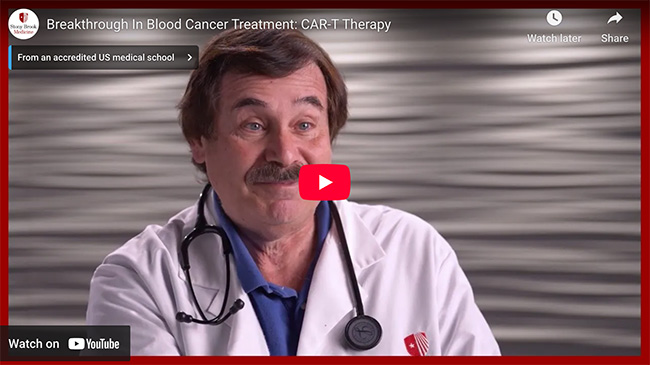Stony Brook Cancer Center treats the full spectrum of blood cancers, including lymphoma, both non-Hodgkin's lymphoma and Hodgkin's disease, multiple myeloma, and both acute leukemia and chronic leukemia. Blood cancers account for about 10 percent of all new cancer diagnoses in the U.S. each year.
Now, more than 1.5 million people with those diagnoses are either living with or in remission today after groundbreaking treatment. That’s because revolutionary new treatments are now widely available, using the patient's own immune system to destroy cancer cells. Immunotherapy treatments such as chimeric antigen receptor (CAR) T cells and bispecific T-cell engager (BiTE) therapy have produced results never previously seen. These treatments are available at Stony Brook Cancer Center.


"These innovative treatments are leading to much better results and patients living longer. In fact, we're curing a higher percentage of patients’ diseases than we ever did in the past,” said Michael Schuster, MD, Director of the Bone Marrow Transplant and Cellular Therapy Program at Stony Brook Cancer Center.”
Recent Treatments
Blood cancers — also called hematologic cancers — begin in blood-forming tissue, such as the bone marrow, or in the cells of the immune system. The cancer immunotherapy treatments chimeric antigen receptor (CAR) T cells and bispecific T-cell engager (BiTE) have great promise in curing blood cancers because they are each used to target cancer cells by activating the patient’s immune system: using their own body to fight off cancer. The key difference is in how they each interact with the tumor cells.
CAR T-cell Therapy
CAR T-cell therapy involves genetically altering a patient's T cells — white blood cells — to help them identify and destroy cancer cells. T cells are part of the immune system and help the body fight infection and cancer. Cancer often hides by becoming invisible to the T cells. Unmodified or natural antibodies are unable to recruit T cells to directly fight the cancer.
CAR T-cells are manufactured antibodies that provide a workaround to help in this process. They come from the patient’s own blood through an IV line and go into a machine that takes out the blood cells, including the immune cells that will be “specially trained” to destroy the patient’s cancer cells. After that, the remaining blood goes back into the body.
The removed immune cells are modified in a laboratory to produce chimeric antigen receptors (CAR), i.e., receptors that can attach to the patient’s cancer cells and allow the CARs to destroy the cancer cells. After enough T cells are engineered in the manufacturing facility, they are infused back into the patient’s body. Then, they further multiply and go to work attacking cells with the antigen that they were programmed to destroy. The patients receive chemotherapy prior to CAR T-cell therapy to prepare their body for the infusion.
CAR T-cell therapy can be very effective, especially when other treatments have not worked. Currently, it is FDA-approved to treat leukemia, lymphoma and multiple myeloma. Potential side effects of both kinds of immune effector treatment are explained below.
BiTE Therapy
Bispecific T-cell engager (BiTE) therapy is another novel immunotherapy approach that helps the body’s immune system target cancer cells. It can also treat the same blood cancers as CAR T-cells, including multiple myeloma, non-Hodgkins lymphoma and acute lymphoblastic leukemia (ALL).
BiTE also uses the T cells to attack and kill cancer cells. But since T cells typically need help to find the cancer cells, BiTE therapy works as the connector between the T cell and the cancer cell. Essentially, it engages T cells to seek and destroy cancer cells. It works when one end of the BiTE hooks onto a protein on the T cell, while the other end attaches to an antigen on the cancer cell and pulls both in next to each other. This allows the T cells to connect to the antigen-marked cancer cell and destroy it.
Depending on the type of cancer being treated, BiTE therapy could be started after multiple rounds of standard chemotherapy or earlier in the course of disease. Because this therapy engages a patient’s own body to fight off cancer, it can be associated with the same unique side effects as CAR T-cells but to a milder extent. These include an inflammatory state called “cytokine release syndrome,” neurologic toxicity called ICANS, and certain infections that are more common in immunocompromised patients.

“Cellular therapy is an exciting field, and we are looking forward to when BiTE therapy can be used extensively beyond blood cancers,” said Alison Stopeck, MD, Chief, Division of Hematology/Oncology at Stony Brook Cancer Center. “We have started adding this treatment for solid tumors, including small cell lung cancer, and are currently participating in clinical trials for other solid tumors, including breast cancer.”
Precision Medicine at Stony Brook Cancer Center
The process of using cell markers and the immune system is a form of precision medicine that can allow targeted treatments to be delivered directly where they are needed, avoiding areas where they are not. Stony Brook Cancer Center experts in the Hematologic Malignancies and Stem Cell Transplant team are already successfully utilizing both CAR T-cell and BiTE therapy as part of their multidisciplinary care for blood-related cancers, cancers of the lymphatic system, and bone marrow disorders.
According to Dr. Schuster, the new immunologic approaches, as well as understanding the growth and signaling mechanisms inside cancer cells, have also led to targeted drugs that have resulted in “what can honestly be called miraculous treatments.” And clinical trials at Stony Brook Cancer Center are helping to bring these drugs into clinical practice and are a key component of continued research in these areas.
INFORMATION & APPOINTMENTS: (631) SB-CANCER (722-2623).
Visit: Hematologic Malignancies and Stem Cell Transplant Team

